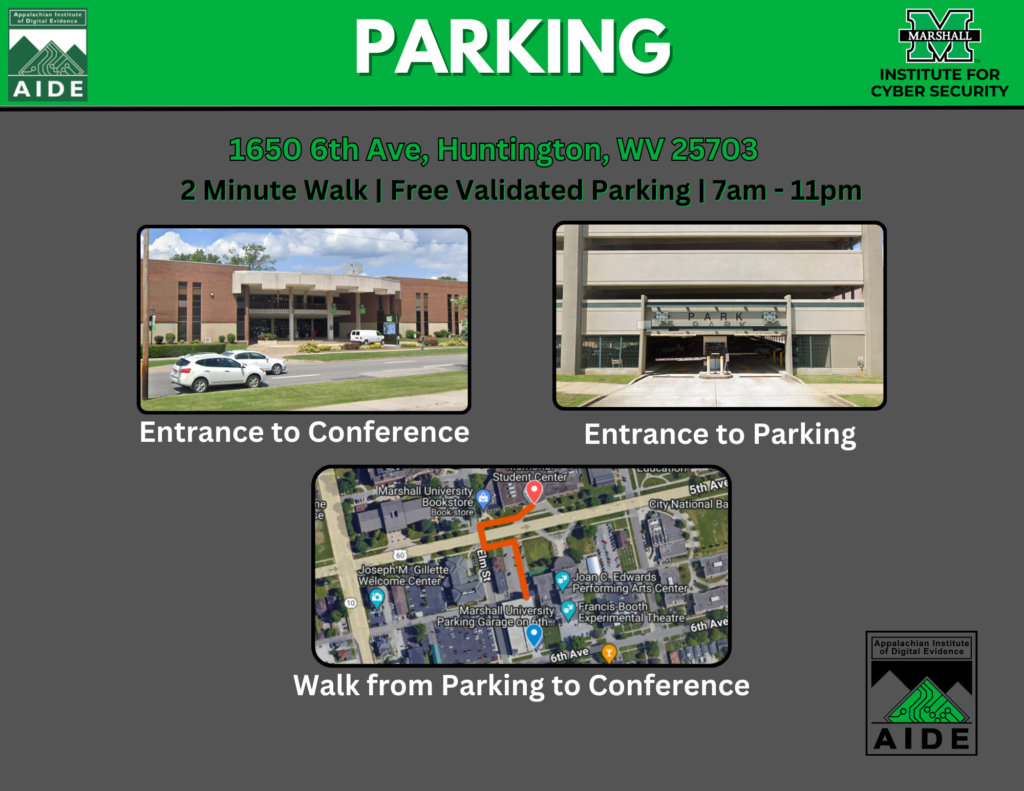AIDE 2024 has concluded!
Thank you to all who attended for a great conference. We look forward to seeing you again next year!
Conference Dates and Topics
| Don Morris Room | |
|---|---|
| 9:00 AM | Melinda Cash (FBI) – Digital Forensics: What is it and what you might be missing? |
| 10:00 AM | Dawn Smith (WVSP) – Advancing Law Enforcement: Leveraging the Internet of Things for Enhanced Investigation Strategies |
| 11:00 AM | Dan Miller (Parkersburg PD) – Case Study |
| 12:00 PM | LUNCH |
| 1:00 PM | Dan Miller (Parkersburg PD K9) – K9 Electronic Device Detection Demonstration |
| 2:00 PM | Matt Osborne (OUR) – Operation Underground Railroad Support of Law Enforcement |
| 3:00 PM | Bryan Chomicki (USSS) – UPMC Data Breach: “The Death Star” |
| 4:00 PM | Jeremy Thompson (South Charleston PD/USSS) – Case Study: EMENI Digital Forensics Fraud |
| 5:00 PM | END OF DAY |
| 2W22 (ICS) | Shawkey Room (OSINT) | |
|---|---|---|
| 9:00 AM | Dr. Gary Kessler – Maritime Cybersecurity | Nicole Barrios (OUR) – Open-Source Intelligence in Human Trafficking |
| 10:00 AM | MSG Charles “Chuck” Weissen (WVNG) – OT Collaboration is Possible | Branden Miller – OSINT Talk |
| 11:00 AM | Dr. Chris Ramezan (WVU) – Separating the Signal from the Noise: Mischaracterizations of Operational Technology (OT) Cyberattacks | David Taylor (WVFC) – Utilizing Open Source Intelligence, Call Detail Records, and Geolocation data in Homeland Security Operations |
| 12:00 PM | LUNCH | LUNCH |
| 1:00 PM | CPT Will Pauley (WVNG) – Transportation Cybersecurity | Bryson Justice (WVFC) – Leveraging Open Source Intelligence for Homeland Security |
| 2:00 PM | John Sedoski (PenLink) – Importance of Geo-Analysis in Cyber Investigations | |
| 3:00 PM | Mickey Barry (Fusion Technologies) | Josh Spence (CIO, Alpha Technologies) – Implications of AI on OSINT |
| 4:00 PM | ||
| 5:00 PM | END OF DAY | END OF DAY |
| 2W22 (Cyber Forensics) | Shawkey Room (Cyber Security) | |
|---|---|---|
| 9:00 AM | Jack McFee (MU ICS) – IoT Forensics: Smart Home Secrets | Jody Ogle (CISA) – Secure by default, Secure by Design |
| 10:00 AM | Fred Pickering (HSI) – Operation Blue Light | Jon Cutler (MU IT) – Creating a Cyber Security Governance Risk and Compliance (GRC) Program without Breaking the Budget |
| 11:00 AM | Jacob Hewitt (WV Fusion Center) – Leveraging Digital Forensic Artifacts for Intelligence Building | Bryan Chomicki (USSS) – Case Study: Operation Mother City |
| 12:00 PM | LUNCH | LUNCH |
| 1:00 PM | SA David Slagle (HSI) – Dark Web/Cryptocurrency | Bill Gardner (MU ICS) – Getting Hired in Cybersecurity |
| 2:00 PM | SA David Slagle (HSI) – Dark Web/Cryptocurrency | Ms. Yansi Keim (Purdue) – Capture the Flag Competitions |
| 3:00 PM | Rob Attoe (Spyder) – Navigating the Complexities of OneDrive Artifacts | Mick Douglas – InfoSec Innovations |
| 4:00 PM | Rob Attoe (Spyder) – Navigating the Complexities of OneDrive Artifacts | Joshua Marpet – Define Pentest, Please |
| 5:00 PM | END OF DAY | END OF DAY |
| 2W22 (Cyber Forensics) | Shawkey Room (Cyber Security) | |
|---|---|---|
| 9:00 AM | Dr. Kate Seigfreid-Spellar (Purdue) – Identifying Digital Forensic Artifacts Related to a Hybrid Risk Assessment Model for CSAM Offenders | Dave Parsons (CISA) – Water and Wastewater Cybersecurity: IT/OT Convergence |
| 10:00 AM | Jeremy Thompson (S. Charleston PD/USSS) – Vehicle Telematics | Matt Perry (Opentext) – Burp Suite |
| 11:00 AM | Alex Hamerstone (TrustedSec) – Your Future Information Security Team Probably Won’t Be What You Expect | |
| 12:00 PM | LUNCH | LUNCH |
| 1:00 PM | Elijah Brigham (HSI) – Memory Forensics and Malware Analysis CTF Review | Panel: Kevin Johnson, Alex Hammerstone, Joshua Marpet, and Bill Gardner – Mimir Speaks: Understanding our paths into InfoSec from the People who have walked them |
| 2:00 PM | Elijah Brigham (HSI) – Memory Forensics and Malware Analysis CTF Review | Kevin Johnson (Secure Ideas) – Orion’s Quest: Navigating the Cyber Wilderness – Tales of Modern Penetration Testing |
| 3:00 PM | Chris Vance (Magnet Forensics) – Mobile Forensics: Rules of Engagement | Brent White & Tim Roberts (We Hack People) – Covert Entry War Stories from the Field |
| 4:00 PM | Chris Vance (Magnet Forensics) – Mobile Forensics: Rules of Engagement | Jayson Street (Secure Yeti) – Social Engineering A.I. & Humans for the greater good! |
| 5:00 PM | END OF DAY | END OF DAY |

Platinum Sponsor
Thank you to our sponsor, Alpha Technologies for their generous donation! Please check out their services at Technology solutions and Managed IT services| Alpha Tech, WV (alpha-tech.us).
Helpful Conference Information
Please check in on the first day to receive your badge. Faculty will also receive their conference shirt at this time. The check-in table will be on the venue’s first floor.



Through Out the Day
Snacks and refreshments will be provided throughout the day. All attendees are responsible for their own lunch and dinner; however, there are restaurants in the venue.
Specialized Career Fair for Cyber Forensics and Security - March 7th (10am-1pm):

We are thrilled to announce a NEW and specialized career fair scheduled for March 7th from 10 am to 1 pm. This event is tailored specifically for employers looking to engage with students from our Cyber Forensics and Security program. Notably, our program holds recognition as a National Center of Academic Excellence. This is a unique chance for your company to connect with highly skilled and motivated students specializing in Cyber Forensics and Security.
Employers who wish to send representatives this event should contact:
Our Sponsors
We are extremely thankful for the following sponsors who helped to bring AIDE to everyone at no cost:


